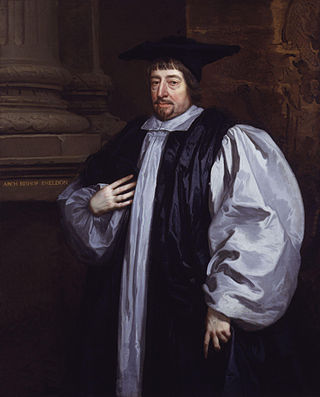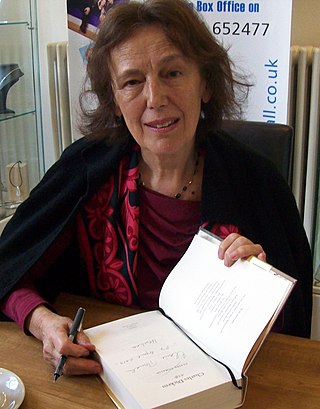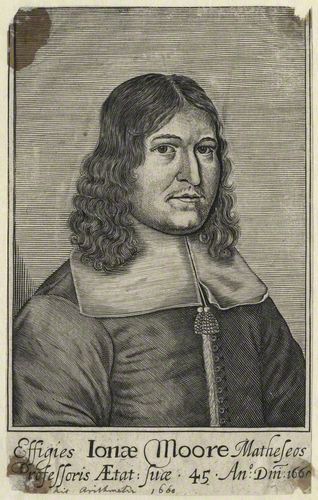
Samuel Pepys was an English diarist and naval administrator. He served as administrator of the Royal Navy and Member of Parliament and is most famous for the diary he kept for a decade. Pepys had no maritime experience, but he rose to be the Chief Secretary to the Admiralty under both King Charles II and King James II through patronage, diligence, and his talent for administration. His influence and reforms at the Admiralty were important in the early professionalisation of the Royal Navy.

Gilbert Sheldon was an English religious leader who served as the Archbishop of Canterbury from 1663 until his death.

John Wilmot, 2nd Earl of Rochester was an English poet and courtier of King Charles II's Restoration court, who reacted against the "spiritual authoritarianism" of the Puritan era. Rochester embodied this new era, and he became as well known for his rakish lifestyle as for his poetry, although the two were often interlinked. He died as a result of venereal disease at the age of 33.

Denzil Holles, 1st Baron Holles, was an English statesman, best remembered as one of the Five Members whose attempted arrest by Charles I in January 1642 sparked the First English Civil War.
This article contains information about the literary events and publications of 1660.

Claire Tomalin is an English journalist and biographer, known for her biographies of Charles Dickens, Thomas Hardy, Samuel Pepys, Jane Austen and Mary Wollstonecraft.

The flageolet is a woodwind instrument and a member of the fipple flute family which includes recorders and tin whistles. Its invention was erroneously ascribed to the 16th-century Sieur Juvigny in 1581. There are two basic forms of the instrument: the French, having four finger holes on the front and two thumb holes on the back; and the English, having six finger holes on the front and sometimes a single thumb hole on the back. The latter was developed by English instrument maker William Bainbridge, resulting in the "improved English flageolet" in 1803. There are also double and triple flageolets, having two or three bodies that allowed for a drone and countermelody. Flageolets were made until the 19th century.

Nathaniel Crew, 3rd Baron Crew was Bishop of Oxford from 1671 to 1674, then Bishop of Durham from 1674 to 1721. As such he was one of the longest-serving bishops of the Church of England.
William Fuller (1608–1675) was an English churchman.

Mary "Moll" Davis, also spelt Davies or Davys, was a courtesan and mistress of King Charles II of England. She was an actress and entertainer before and during her role as royal mistress.

Thomas Gale was an English classical scholar, antiquarian and cleric.

The Duke's Company was a theatre company chartered by King Charles II at the start of the Restoration era, 1660. Sir William Davenant was manager of the company under the patronage of Prince James, Duke of York. During that period, theatres began to flourish again after they had been closed from the restrictions throughout the English Civil War and the Interregnum. The Duke's Company existed from 1660 to 1682, when it merged with the King's Company to form the United Company.

Sir Anthony Deane FRS (1633–1721) was a 17th-century mayor of Harwich, naval architect, Master Shipwright and commercial shipbuilder, and Member of Parliament.
Sir Thomas Honywood was an English soldier during the English Civil War and later a Member of Parliament and also called to Parliament as Thomas, Lord Honywood. He was seated at Marks Hall, Essex.

Sir Jonas Moore, FRS (1617–1679) was an English mathematician, surveyor, ordnance officer, and patron of astronomy. He took part in two of the most ambitious English civil engineering projects of the 17th century: draining the Great Level of the Fens and building the Mole at Tangier. In later life, his wealth and influence as Surveyor-General of the Ordnance enabled him to become a patron and driving force behind the establishment of the Royal Observatory, Greenwich.
Admiral Sir John Holmes was an English naval leader who rose to be Commander-in-Chief of the fleet in the English Channel (1677–79) and was the younger brother of the more famous Admiral Sir Robert Holmes.
Thomas Povey FRS, was a London merchant-politician. He was active in colonial affairs from the 1650s, but neutral enough in his politics to be named a member from 1660 of Charles II's Council for Foreign Plantations. A powerful figure in the not-yet professionalised First English Empire, he was both "England's first colonial civil servant" and at the same time "a typical office holder of the Restoration". Both Samuel Pepys and William Berkeley, Governor of Virginia, railed at times against Povey's incompetence and maladministration.
Ralph Greatorex was a mathematical instrument maker. He was an apprentice of London clockmaker Elias Allen.
John Birchensha (c.1605–1681) was an English Baroque music theorist. He presented at the Royal Society and made an impression on its members in the 1660s and 1670s.










